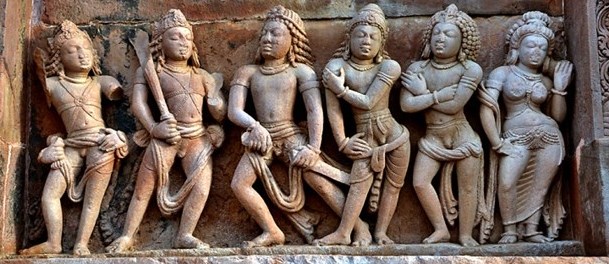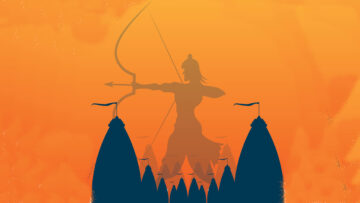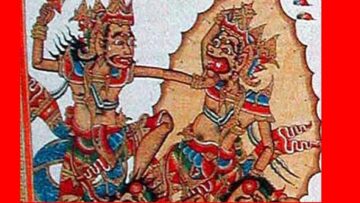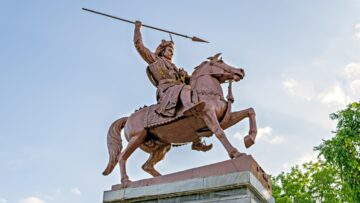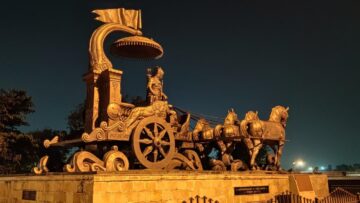(Pic: From Google)
Often, context is key to gaining a better understanding from and of the Mahabharata. Take Yudhishthira for example. Also known as Kunti-putra, Kaunteya, Dharmaraja, Partha, and so on, he was the embodiment of dharma and a strong advocate of non-violence. The Mahabharata tells us that he was Lord Yama himself born on earth. The Markandeya Purana tells us he was a part of Indra, representing dharma, born on earth.
Sometime after Dharmaraja had lost everything and everyone the Pandavas had, to Shakuni in the crooked game of dice, and after he had played again and lost again, fating the Pandavas to thirteen years of exile (the last year was to be spent among people, without being discovered), he was questioned by Draupadi about his forgiving nature. After all, he had lost his kingdom, all the riches, himself, his brothers, and his wife. Yet he was given to forgiving the Kauravas. How could he be so docile, even weak? Her point was that “under no circumstances should you show and forgiveness towards your enemies.” Whether Yudhisthira emerged victorious or not in such a battle was a separate issue, but at least he would have pride.
To that end, she related what Bali, Prahlada’s grandson, had asked of his grandfather – “Does forgiveness lead to welfare, or is it better to seek revenge?” Prahlada’s answer is instructional, but I will cover it elsewhere, except to add that Prahlada begins his response with this statement, “Revenge is not always superior. Nor is forgiveness always superior.” Deliciously subtle!
Yudhishthira’s long answer to Draupadi basically posited that forsaking anger was the key and he quoted the sage Kashyapa in defence of the virtues of forgiveness: “‘Forgiveness is dharma. Forgiveness is sacrifices. Forgiveness is the Vedas. Forgiveness is the sacred texts. He who knows this is capable of forgiving everything. Forgiveness is the Brahman. Forgiveness is the truth. Forgiveness is the past and the future. Forgiveness is austerities. Forgiveness is purity. Forgiveness holds up the entire world. Forgiving ones attain the worlds of ascetic ones who know the Brahman and those who know about sacrifices. Forgiveness is the energy of the energetic. Forgiveness is the Brahman of the ascetics. Forgiveness is the truth of those who are truthful. Forgiveness is alms. Forgiveness is fame.’”
Yudhishthira then tells Draupadi that all Kshatriyas spoke of peace – Bhishma, Vidura, Kripa, Sanjaya, Yuyutsu, Ashvatthama, Somadatta, all, and that he had forgiven the Kauravas in the hopes that he would get the kingdom back when the time came.
It was also Yudhishthira who was reluctant to utter a lie to get Drona to lay down his arms on the Kurukshetra battlefield. When he did, it was only after much persuasion from Krishna and Bhima, and when he did finally utter the words, added that the clarification that an elephant named Ashvatthama had been killed.
Lastly, we also know that after the war had ended, Yudhishthira wanted nothing of the Kuru kingdom. This is recounted at length in the Upa-Parva of the Shanti Parva called Raja Dharma Parva, beginning with the first chapter, when Yudhishtira laments, “To me, this victory seems to be a defeat.”
But is this the whole picture of Yudhishthira? Most retelling and simplified abridgments leave out crucial details and vital context.
Like in the Aranyaka Parva, when Yudhishthira responds to Bhima’s accusations and exhortations that “For Kshatriyas, there is no dharma other than fighting” by summarizing for Bhima what they – the Pandavas – would have to fight if they chose to pick up arms at that point in time. Bhurishrava, Shalya, Jarasandha, Bhishma, Drona, Karna, Ashvatthama, and Dhritarashtra’s sons were all ready with their arms, ‘ready to murder’, in Yudhishtira’s words. All the kings that the Pandavas had defeated were now on the Kaurava side, ready to ally with Duryodhana on the battlefield against the Pandavas. Bhima had no response to Yudhishthira’s cold logic. Beneath Yudhishthira’s talk of peace and forgiveness lay a certain practical assessment of ground realities. What did the Pandavas do next? Vyasa counselled them to send Arjuna in search of divine weapons that would help even the scales. Thus began Arjuna’s multi-year quest for divine weapons that would take him to Indraloka, a meeting with Urvashi, a curse, and more.
Now, coming to the battlefield, when Yudhishthira uttered a lie. Why did he do so? His chariot, that rode four fingers above the ground, touched the ground as a result of his uttering a lie. A half-lie, if you must. Yudhishthira did not want to utter a lie, but the Mahabharata also tells us that Partha (Yudhishthira) ‘was also immersed in the prospect of victory’. Yes, he did so at Bhima and Krishna’s urging, but Yudhishthira was also fighting that war to win.
Lastly, what about Yudhishthira’s lament about not wanting the kingdom at such a heavy price? Well, let us go back to the Tirtha- Yatra Upa- Parva of the Shalya Parva. Duryodhana entered a lake to hide himself from the Pandavas (Hrada-pravesha), and the Pandavas discovered his location, informed of Duryodhana’s whereabouts by spies. Challenged and taunted in turn by Yudhishthira, he finally relented and came out of the lake to fight. Yudhishthira even granted Duryodhana two boons – that he would get to fight with a weapon of his choice, and that he could fight with any Pandava; the result of that fight would determine the final outcome of the entire war. But ignoring this final gambler’s impulse of Dharmaraja, Yudhishthira also told Duryodhana – “With the exception of your life in battle, what else do you desire?” Yudhishthira was willing to grant a lot, but the same Yudhishthira knows that this was a battle to the end. One would have to die. There would be no forgiveness, no peace, or no mercy.
What about the second thing that Yudhishthira told Duryodhana? “If, between the two of us, both of us remain alive, all beings will be uncertain about who has emerged victorious.”
For one to emerge victorious, the other had to die. These were not the words of Bhima, or Arjuna, or even Krishna. These were Yudhishthira’s chilling words. This is a side of Yudhishthira that is often ignored. Context is key. Which is why reading the Mahabharata in its entirety, unabridged, is invaluable.
Disclaimer: The opinions expressed in this article belong to the author. Indic Today is neither responsible nor liable for the accuracy, completeness, suitability, or validity of any information in the article.

